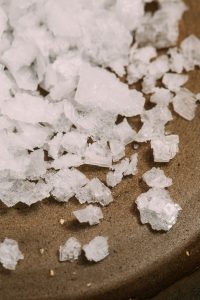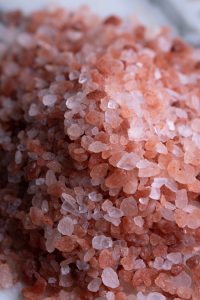A common misconception is that any salt your purchase is safe for making pickles. Using the correct type of salt is important whether you are making fermented pickles or refrigerator pickles. Salt may seem simple, but there is a lot to know.
What salts are safe for making pickles? Pickling salt, Kosher salt, and Sea Salt are safe for making pickles. Do not use table salt for making pickles since it may contain iodine and anti-caking agents, and do not use rock salt or Himalayan salt as it may contain impurities. These can impact how your pickles turn out by altering the color and firmness.
| Type of Salt for Pickling | Recommended | Not Recommended |
| Kosher Salt | X | |
| Natural Sea Salt | X | |
| Pickling Salt | X | |
| Table Salt | X | |
| Rock Salt | X | |
| Himalayan Salt | X |
While you may think it is a simple ingredient, there is actually a lot to know about salt. Salts can vary by coarseness, additives, and where they are sourced. All these factors are important to making a good pickle.
Coarseness and Proper Measurement
Not all salts are created in the same way. Salts are usually labeled as “fine” or “coarse”. Kosher salt usually is sold as coarse ground. Typical table salt is fine ground, and due to being so fine it usually has anti-caking agents and iodine added to it which are not desirable in your pickle recipe.
Most pickle recipes call for salt, but the recipe may call for a salt by volume, whether it is a cup, tablespoon, etc. Since coarse granules allow for more airspace between them, you may fill the same space with less salt than if you used finely ground. Simply put, a tablespoon of fine salt is a different amount of salt than a tablespoon of coarse salt. Due to this difference, it is important to measure salt by weight. It is especially important when making fermented pickles since the salt level of the brine impacts the fermentation process.
The term “sea salt” is not official, but used to denote the absence of other ingredients, being only sodium chloride. When making pickles the, observable difference is in how coarse and fine salt dissolve in water. Some recipes will suggest heating up water before adding salt so it dissolves easier. Pickling salt is created as finely ground to make it easier to dissolve in water.
Salts You Should Use
The salts that are recommended for making pickles are pickling salt, Kosher salt, and natural sea salt. Pickling salt is typically fine ground but Kosher salt and Natural Sea Salt will come in coarse ground. When selecting a salt, it is critical to confirm that there are no additives for the best pickle.
Kosher salt that is sold with the Kosher certification label ensures there is an agency making sure nothing is mixed in and you are getting pure salt. The term kosher salt originates from the usage of salt in the kosher preparation of meat, as it draws out the blood. Kosher salt is sold as coarse ground because a finely ground salt will just dissolve into meat. Chabad.org offers a lot of great information on the history of Kosher salt and the more.

Salts You Should Not Use
When choosing a salt for making pickles, there is no one type of salt to avoid by looking at the label. Checking the ingredients, and the if it is coarse or fine ground depending on your needs for the recipe, are what matter the most.
The main issue with salts you should not use for making pickles is the presence of iodine and anti-caking agents. These can impact the taste of the pickle, cloudiness of the brine. There are also specific concerns dependent on if you are making refrigerator pickles, also known as fresh pack pickles, or fermented pickles.

Why Is Salt Used In Pickles?
The usage of salt in pickles differs in whether you are making fermented pickles or refrigerator pickles. In either case, the choice is the same, but it is important to know why salt plays a different role in each of these two main types of pickles.
Fermented pickles are made in a salt brine to allow for the cultivation of Lactobacillus, which is required for producing lactic acid needed for fermenting pickles. While studies have shown that iodine does not produce a statistically significant impact on Lactobacillus, it is considered a best practice to use pure salt when making pickles, especially fermented. This will allow the bacteria to do what it does best without any additional factors to present an obstacle.
Refrigerator pickles call for vinegar and are made quicker than fermented pickles. The presence of iodized table salt can have an impact on the taste and color of your pickle. Cloudy brine and an odd taste will not hurt you, but no one wants to serve, or eat, pickles like that. When in doubt, use quality natural ingredients. No one wants a funny looking pickle.
Is It Safe to Use Gourmet or Fancy Salts?
Let’s says you find a fancy Pink Himalayan salt, very course ground and you want to use it in your pickle recipe. Are these fancy salts safe to use for making pickles? While these salts may be colorful, expensive, and an extra coarse ground that suggests higher quality, these qualities do not determine if the salt will help make a better pickle.
Many of these fancier salts, such as rock salt, have other colors to them. This may indicate impurities in the salt, which is what gives them their color. Due to this, it is preferable to select a pure salt, even though something more gourmet appearing may catch your eye at Home Goods.
Experimenting with recipes is the best part of pickling. While salts may vary, it is important to be consistent in quality and purity, and not be fooled by fancy packing. You may find additional benefits to these colorful salts, but none of them have been scientifically proven.
While these salts may have a place in your cabinet for other dishes such as meats, be picky when it comes to your pickles.
